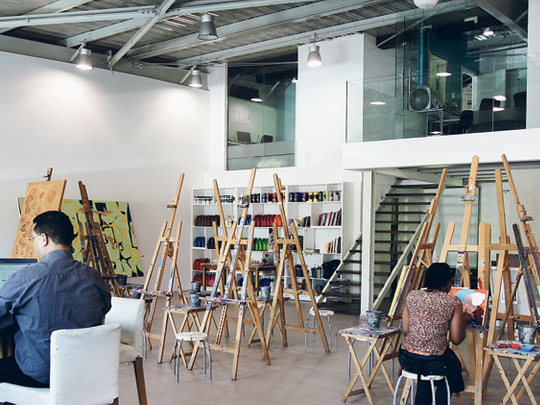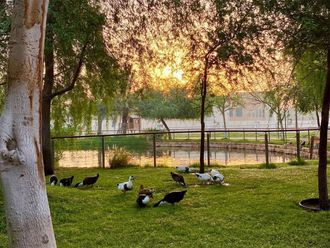
Dubai: The city's Al Quoz Industrial Area is a dusty maze of potholed streets that are home to an army of trucks and blue collar workers during the day.
But it is becoming increasingly common to see the odd trotting high heel or the fashionable and artsy of Dubai's residents flurrying in and out of the smoggy industrial area.
Tucked away in corners of Al Quoz are a number of art galleries and cultural centres that are slowly turning the area into the cultural heart of contemporary Dubai.
‘Plastic city'
Borne out of a need to fill what many see as a vacuum of Dubai culture that is truly representative of its diversity and continuous evolvement, organizers and enthusiasts say Al Quoz dispels the notion that Dubai is "plastic city".
"It knocks the whole Dubai cliché on its head, and thank God for it," says Shelly Frost, founder of the Fridge a live music venue and booking agency that provides Dubai based musicians for events for a commission.
Frost moved to Dubai for a job as a harpist for a new hotel 13 years ago but realized that musicians in the city needed a platform, "a place for the performance arts, where people can meet" which led her to launch The Fridge.
Al Quoz today is home to more than 20 cultural centres, all based in warehouses with wide, open spaces and high ceilings.
Dubai residents flock to the industrial area in the evenings for live performances, movie screenings, workshops, group discussions or a quick cup of coffee.
Nurturing local artists
"Three years ago there were only about five galleries here. Now there are 17," says Hetal Pawani, founder of thejamjar, a gallery that provides art to companies and has worked to nurture local artists.
That has made Al Quoz the largest art district in Dubai, she adds.
On a recent musical evening at thejamjar, a jazz band consisting of Europeans, North Americans and Arabs performed before a group of Dubai residents from different backgrounds as they rested on beanbags. The songs were sung in Arabic, French and English.
That blend of Arab and non-Arab culture can help Dubai create a contemporary identity that is unique to it, say observers.
"You can get the most edgy of jazz, dance and classical music in the region," says Frost. Al Quoz plays a major part in bringing that to fore.
‘Al Quoz phobia'
Despite the difficulties of reaching the galleries due to its winding roads, and peoples' lack of familiarity with the area, which Frost calls "Al Quoz phobia", Pawani says thejamjar made a conscious decision to move there from Bur Dubai three years ago.
"We have more freedom and flexibility in warehouses. They are big, open spaces, the ceilings are high and the rent is cheap… it happens all over the world; organic art spaces come out of industrial areas… much like the Meat-packing district of New York and 798 Art Zone in Beijing," she says.
The arrival of art centres has also attracted surrounding industry to complement it such as design houses, cafes, furniture stores, printing presses and carpentry workshops "which make Al Quoz a self-sustaining district," she says.
Different expats
Al Quoz based curators say there is a regular, "niche" crowd that congregates there, which represents the diversity of the city's expatriates, Arabs and Emiratis who organisers say crave cultural activity and want to meet like-minded people.
The kind of crowds the area attracts are a far cry from the stereotypical expatriate Dubai residents who flocked to Dubai during the boom while it lasted.
Frost says Al Quoz's cultural centres have filtered the expatriates that have come to Dubai to cash in from those who want to one day leave the city having enriched themselves culturally and artistically.
"You have two sorts of expatriates in Dubai. Some come with a short term plan, are self-centred and socially and artistically boring, and those who are interested in making the experience here richer," she explains.
Mish'al Al Gergawi, a culture commentator, concurs: "There are two kinds of expats, the transient ones and the ones who feel they are part of Dubai. I'd like the former to have as little impact as possible and the latter to have [more]," he says.
Negative impact
The economic downturn has had a negative impact on the art and culture scene with sponsors and art collectors choosing to save their money, and some centres having to downsize and reduce the number of events they hold.
"I worry about the capacity of [cultural centres] to continue to play an important role without support from the government during these hard times," says Al Gergawi.
He says that the government can help by limiting the escalation of permission fees and rents in Al Quoz.
However, some art enthusiasts say that there is a bright side to the crisis.
"Economic slowdowns bring big change and it will only be positive for the arts and culture in Dubai. The slowdown [here] has given galleries a chance to finally change their approach and focus on local artists and local production," says Pawani.
Frost says that the downturn has also led local hotels to look more strongly towards locally based musicians for performances, instead of hiring them from abroad.
That, coupled with the falling cost of living, has given full time musicians a more permanent presence in the city.
"They can maintain a lifestyle here doing music jobs," says Frost. "Guitarists and singers would make more money here than [a number of] other places".
She adds however that the talent pool, while it is "world class", remains small, but is slowly growing as the city attracts more musicians.
Change needed
Al Gergawi, however, says there is a long way to go for places like Al Quoz to grow into cultural hubs in the city. He has called for the "deregulation" of culture by the authorities, which could allow it to grow organically.
He argues that the authorities in should Dubai to take small cultural ventures more seriously, adding that, if nurtured, they can become a significant contributor to the city's economic growth.
Just ‘noise'
"They think it's unimportant and frankly, it's just ‘noise' to them," he says, referring to the government bodies that are tasked with giving permission for events held at the venues.
The process of getting approvals, he says, is time consuming and expensive, and suggests that the government can help the art scene by limiting the escalation of permission fees and rents in Al Quoz.
Curators say that in terms of the fee structure, the authorities do not distinguish between major events where artists are flown in from abroad, and small events, in which locally based artists participate.
Frost suggests the lowering or waiving of permission fees for venues that hold events where local artists perform.
The issue of rezoning Al Quoz has also been raised by those who insist that the area should be considered more than just a warehouse and storage area.
If attitudes towards the arts become more welcoming, giving it greater importance in the city, including an increase in corporate funding, more jobs will be created in the arts, says Pawani.








